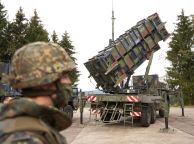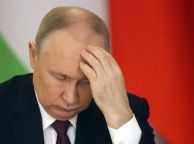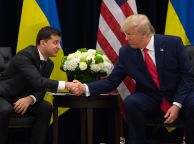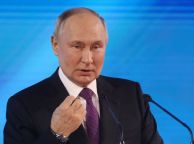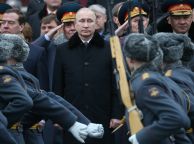By Ellie Cook
With Russian missiles raining down and Ukraine's air defenses scarce, Kyiv has upped the ante in its push for advanced Patriot missiles to shield its people and its vital infrastructure, with top officials saying there are many available around the world.
Intense Russian bombardment has forced Ukraine to double down on its increasingly desperate search for ground-based air defenses. The U.S.-made Patriot, the gold-standard of air defense credited with intercepting Russia's supposedly unstoppable hypersonic missiles, sit firmly at the top of Kyiv's wish list.
"Give us the damn Patriots," Kyiv's Foreign Minister, Dmytro Kuleba, told Politico in late March. Shortly after, Ukrainian leader Volodymyr Zelensky said the country needed 25 Patriot systems, with up to eight batteries each, "to cover Ukraine completely."
Ukraine currently operates at least three Patriots, one of which is located around the capital. Kyiv received donations from the U.S., Germany and the Netherlands, and at least one battery has been damaged, although it is thought to have been promptly repaired.
Kuleba said he was putting his efforts into sourcing seven Patriots as quickly as possible. There are around 100 of the systems globally that could be transferred to Ukraine, he told The Washington Post earlier this month.
The same figure was put forward by the European Union's top security diplomat, Josep Borrell, who said "Western armies have about 100 batteries of Patriot."
"It should be inconceivable" that European countries are not able to provide the Patriot batteries Kyiv has requested, Borrell said during a conference in Brussels on April 9. "And still, we are not able to provide the seven they are asking desperately for."
However, NATO Secretary General, Jens Stoltenberg, disputed this figure, saying at a press conference on Wednesday that there are "significantly" fewer than 100 in Europe.
"I cannot go into the exact numbers because that's classified information," he said. "But of course, the whole alliance has a significant number of Patriot batteries," he added. The U.S. accounts for the bulk of this number and has "global responsibilities" that need the weaponry.
"But the reality is that of course, we have systems available that are big enough to enable us to deliver significantly more to Ukraine when it comes to air defense in general and also when it comes to Patriot batteries, and that's exactly what we're working on," Stoltenberg told the media.
"We know that many countries are sitting on large piles of Patriot systems, maybe not wanting to deliver it directly," Dutch Prime Minister, Mark Rutte, said in remarks reported by The Guardian on Wednesday. "We can buy it from them, we can deliver it to Ukraine, we have the money available. It's crucial."
A total of 19 nations use Patriots, according to U.S. defense company Raytheon, which manufacturers the radars and ground systems for the hardware. Fellow U.S. defense firm, Lockheed Martin, produces the various generations of interceptor missiles for defense hardware.
The U.S. is joined by Germany, Greece, Sweden, Poland, Romania, the Netherlands and Spain across Europe in using the Patriot. Israel, Kuwait, Qatar, the United Arab Emirates and Saudi Arabia also use the system, as do Japan, South Korea and Taiwan.
The U.S. also approved a sale worth nearly $2.5 billion to Bahrain in May 2019 for "various Patriot missile systems and related support and equipment." Switzerland has bought the weaponry, and, in November 2023, it purchased the latest, most advanced missiles.
Raytheon has built a total of more than 240 Patriots, and is increasing its production to 12 per year, the company's chief executive, Greg Hayes, told The Wall Street Journal in June 2023.
Yet many countries insist they do not have Patriots to give, citing concerns over keeping up their own air defense networks after years of lulled defense spending across Europe. There are also questions about how to distribute Patriot resources with air defense demands in Israel, and making sure Taiwan is stocked up, Marina Miron, a postdoctoral researcher with the War Studies Department at King's College London, told Newsweek.
Germany announced earlier this week that it would send another Patriot battery to Ukraine "immediately."
"This is a real manifestation of support for Ukraine at a critical time for us," Zelensky said in a post to the Telegram messaging app. "I call on all other leaders of partner states to follow this example."
Kuleba said earlier this month that "active negotiations" for another two Patriot systems were underway, without elaborating. The Financial Times reported Ukraine is in talks with Spain and Poland for these systems, citing anonymous officials.
The need will likely only grow, with a Russian offensive on the horizon and no shortages of missiles in Moscow's cache.
It is not just the systems, it is the missiles, too, experts say. "Most importantly, those air defense systems need interceptor missiles to be effective," said Frederik Mertens, an analyst with the Hague Centre for Strategic Studies. "Without them, they can only stare at the sky and at best warn that a raid is incoming," he told Newsweek.
"Ukrainian air defenses are not a luxury," he added. "They might very well mean the difference between a war lost and a war won."
Earlier this month, a Russian missile barrage destroyed the Trypilska plant, a major energy provider close to Kyiv. Zelensky later told PBS that Ukraine "ran out of missiles" to defend the plant.
"It's cheaper to buy Patriot systems than to rebuild a power station targeted by the Russians," Borrell told French newspaper, Le Monde, earlier this week.
"We have Patriots, we have anti-missile systems," he said in remarks to the media on Thursday. The systems should be removed from "our barracks where they are 'just in case' and send them to Ukraine, where the war is raging," he said, adding: "Otherwise the electricity system of Ukraine will be destroyed."



